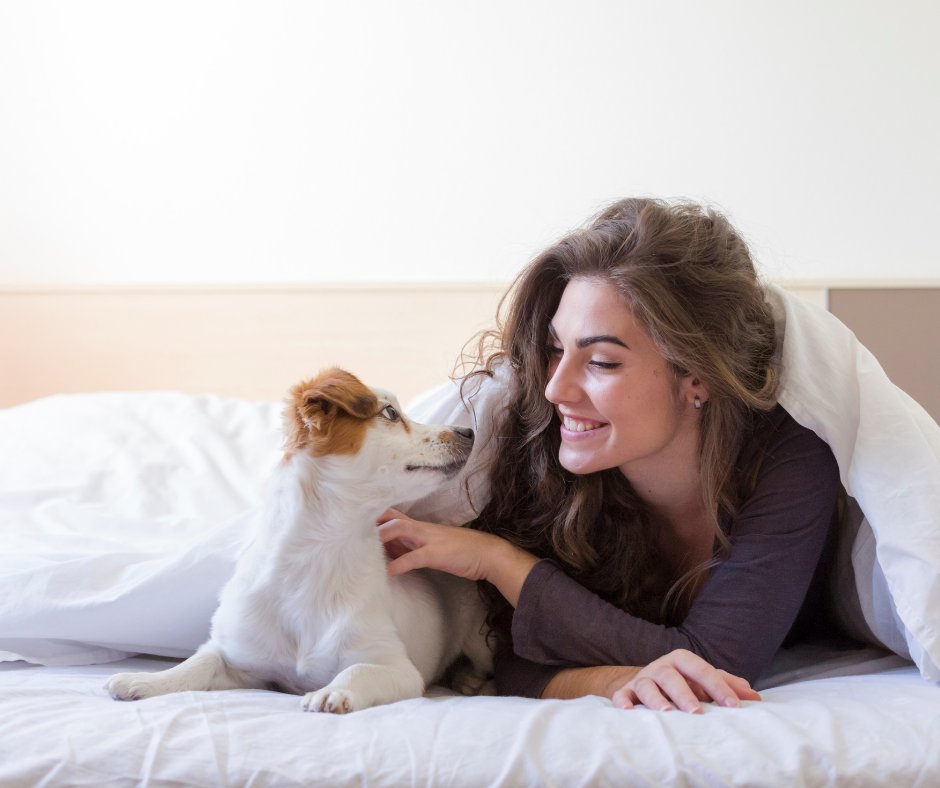We all love our furry, four-legged friends. Because they’re a source of joy, comfort and security during the day, many pet owners choose to keep their furballs close at night as well. The comfort is undeniable, but is it good for your sleep? Like many aspects of your individual sleep routine, your personal circumstances will determine whether or not sleeping by your pet is a good idea.
Studies have shown that some pet owners sleep better with pets in their bedrooms, but not necessarily when their pet is on the bed. Pet size, bed size, the number of people in bed (and the number of pets) are all factors to consider.
Cats versus dogs—who is the better sleep partner?
You should know that cats and dogs aren’t equally suited for nighttime cuddles. While most domesticated dogs adhere to a sleep pattern similar to humans, cats are crepuscular, meaning they’re most active at dawn and dusk. This can lead to challenging sleep situations, especially if you adopt a stray cat that is more predisposed to nocturnal activities like hunting or scavenging.
If your cat regularly disturbs your sleep, you’re not alone. Studies have shown that cats can be as disruptive as having another human in bed with you. And because cats are masters of attention seeking, they might even wake you up on purpose. Bad kitty!
Dogs, on the other hand, can be excellent sleep partners, but it depends on a number of factors. If your dog snores loudly, slobbers, or causes the bed to overheat, it may not be a good sleep companion. Consider balancing your sleep comfort by having your dog sleep next to the bed instead. Additionally, if your dog is very large or tends to move around a lot, it may be better as a bedside companion.
Are there benefits to sleeping with your pets?
Pets are amazing companions, and they’re especially adept at helping relieve stress and anxiety. By creating and maintaining a social and emotional connection, your furry friend can be great for your own mental health. Pets can also provide a sense of comfort and security at night. So much so that it’s estimated over 56 percent of dog owners sleep next to their dogs—who’s a good boy!
Interactions with animals may work wonders for stress-related problems, positively impacting cortisol levels, heart rate, and blood pressure. In fact, one recent study suggested that pets should be considered a main source of support for people with long-term mental health problems.
And, if you’re a woman, you may derive even more comfort from sleeping with your dog. A 2018 study showed that women feel more comfortable and safe sleeping with their dog—even more than sleeping with their cat or partner! Sorry, fellas—you’re out, and Fido is in.
Is it risky to sleep with your pets?
While your comfort and safety seem to be the major upsides to sleeping with your pets, it’s important to consider the potential health risks.
If you’re susceptible to dust and pollen, pets may carry allergens on their fur, aggravating individuals with allergies or asthma. There is also a risk of disease spread by pets, such as from touching feces, licking open wounds, or bringing ticks, fleas, or mites into your bed with them. Additionally, if your dog is ever dominant or aggressive, they may try to claim your bedroom territory as their own, posing a risk for children or bed partners.
For many, the emotional benefits will outweigh potential downsides—it all comes down to personal choice and comfort. Ultimately, it’s up to you to decide whether having a pet sleep with you is a good idea. The benefits should always be weighed alongside the risks, but if your pets are typically well-behaved and don’t disturb your sleep, it may not be a problem for you.
We wrote this post referencing information from MDPI Open Access Journals. You can read the full article here.






